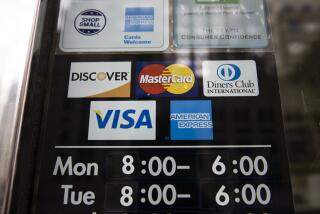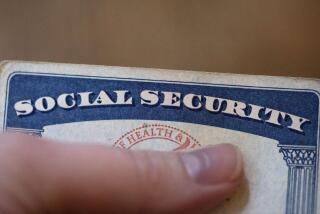How the debt-ceiling crisis could affect ordinary Americans
The rancorous debate over lifting the debt ceiling that has engulfed Washington and Wall Street is increasingly threatening to intrude on the lives of American consumers and individual investors.
The risks were in clear view Thursday as the Dow Jones industrial average fell for the fifth straight session, putting the blue-chip index on track for its worst weekly decline in almost a year. A default on U.S. debt could weigh on people’s financial lives in a myriad of ways, such as boosting interest rates on mortgage loans and denting already fragile retirement accounts if the stock market continues to tumble.
Here’s a look at how the debt-ceiling crisis could affect ordinary Americans and small investors.
Why should average Americans care about the debate on the debt ceiling?
The broadest and most immediate threat is that a failure to raise the government’s borrowing capacity by Tuesday could slam the already weak U.S. economy and worsen joblessness, thus making it tougher for the unemployed to find work and raising the stress levels of those worried about keeping their jobs.
A default almost certainly could cause many types of interest rates to rise, thus making it costlier for businesses and consumers to borrow money for everything from building factories to buying homes. Perhaps more important, the vitriolic negotiations already are raising general economic anxiety, a potentially toxic dynamic that could feed on itself as companies, investors and consumers pull in their horns.
What would happen if a deal is reached by Tuesday’s deadline?
The risk of a downgrade in the U.S.’ once-impregnable credit rating — a notion that seemed inconceivable just a few weeks ago — appears increasingly plausible, in part because the default drama has underscored the country’s troubled finances.
A reduced U.S. credit rating — likely from AAA to AA — could push up interest rates on all sorts of debt. U.S. Treasury bonds are a benchmark against which many other interest rates are set. So an increase in Treasury rates likely would trickle through and push up rates on mortgage, corporate and other loans. The increases likely would be moderate, but that’s small consolation to anyone looking to buy a home or a car.
What is the worst-case scenario?
If politicians don’t strike a deal, the government almost immediately would be unable to pay all its bills.
Though there still would be money coming into the government coffers from taxes, there would not be enough to pay for everything, and the White House and Treasury Department would have to decide what programs to cut off first.
They are unlikely to stop paying interest to the holders of outstanding Treasury bonds, for fear of antagonizing foreign governments that hold large amounts of Treasury bonds. Instead, they would probably stop paying for select government programs and contractors, as during a government shutdown.
It would take some time for this to reach programs such as Medicare and Social Security that are used by many Americans, but the reduction in spending would quickly put a stranglehold on economic growth.
What could happen to the stock market?
Stock prices already have begun falling in recent weeks, and could tumble more if a deal isn’t reached soon, experts say. Investors have fixated on Washington’s debt-ceiling impasse, and the Dow’s five-day skid has brought the index down 484 points.
Investors are selling partly because of overall economic uncertainty and partly because they believe that higher interest rates could eat into corporate profits, which are the lifeblood of stock values.
That is likely to cause pain for small investors checking balances of their mutual funds or 401(k) retirement accounts.
“More and more people are becoming less and less convinced that Congress will do what it needs to do, and the stock market will likely continue to drop by meaningful amounts on a daily basis until this is resolved,” said Sam Stovall, chief investment strategist at Standard & Poor’s in New York.
What is happening with interest rates?
So far, not much. Despite the risk of a debt default by the Treasury, market interest rates on government bonds have risen only modestly from their recent lows.
The 10-year Treasury note yield, a benchmark for mortgage rates, was at 2.95% on Thursday, down from 3.13% three weeks ago.
Experts say rates have remained low for two reasons: First, big investors still believe that a deal will emerge to raise the debt ceiling by the deadline. Second, the U.S. economy’s weakness is encouraging many investors to stash cash in Treasuries as a haven.
But if the U.S. loses its AAA credit rating, wouldn’t that cause investors to dump Treasuries?
That isn’t clear. Tom Tucci, a bond trader at RBC Capital Markets in New York, said his firm has asked many clients what they would do in the event of a downgrade. “A lot of investors are saying it would have no effect” on their Treasury holdings, he said.
One of the major credit-rating firms, Fitch Ratings, said Wednesday it expected that a cut to AA would initially rile the bond market. But “in the near-to-medium term … Treasuries would likely retain their standing as the benchmark security that anchors global fixed-income markets,” Fitch said.
With more than $9 trillion of publicly traded Treasury debt held worldwide, there is no other bond market that offers investors the same liquidity as U.S. debt — meaning the ability to buy or sell quickly.
If interest rates on Treasury bonds were to rocket, how would that affect loan rates?
Rates on new mortgages typically move higher with 10-year Treasury rates, so the battered housing market could face another hit.
Many other loan rates, however, are tied to banks’ prime lending rate, now 3.25%. And that rate isn’t expected to rise until the Federal Reserve begins to raise its key short-term rate. Most economists believe the Fed won’t begin to tighten credit until sometime in 2012, at the earliest.
Are there any safe investments?
The two clear beneficiaries of the market fears so far have been the age-old safe havens of gold and the Swiss franc.
The Swiss currency is seen as an oasis of calm in the midst of the tumultuous European economic scene, and investors have been trading in their dollars and euros for francs in droves. If this continues it will eventually hurt the Swiss economy and investors will seek out other safe economies such as Australia and New Zealand.
Other investors have bought gold in the hope that the precious metal’s scarcity will allow it to keep its value when everything else is falling. That has driven up the price of gold to all-time highs in recent days to nearly $1,620 an ounce, though on Wednesday and Thursday that reversed slightly. But market experts have warned that even gold would be vulnerable if a default or downgrade pushed interest rates up.
For market pros, times of panic can be the best moments to buy risky assets like stocks, when others are selling without thinking clearly.
What is the long-term effect of all this expected to be?
Once the short-term gyrations in the stock markets and gold prices end, many analysts expect a more far-reaching change in the aura of the U.S. government and economy.
For decades, U.S. Treasuries have been the most stable place for investors to park their money, and this has made it possible for the U.S. government to borrow as much money as it has wanted at low rates.
Looking forward, “it seems highly unlikely that the global financial system will simply settle back to the structure and functions of the pre- ‘Great Debt Debate’ era,” Rochdale Securities analyst Richard Bove told clients Tuesday.
Already, investors are looking for newer, safer places to park their money. This shift will make it harder for the U.S. to fund future deficits and will diminish America’s central role in the global economy.






